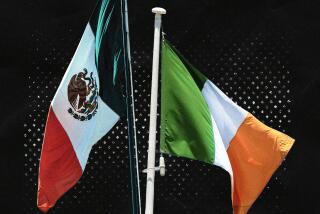Ulster’s Hopeful Spark
- Share via
The Irish Republican Army’s decision finally to destroy its weapons cache puts the future of Northern Ireland more firmly on a political rather than a military path. It is a hopeful spark in the world’s current gloom.
The IRA kept the details of the arms decommissioning a secret, but an international panel verified that it had occurred and that the arms were “beyond use.” The IRA believed that handing over weapons or being photographed destroying them would be seen as the surrender of a defeated army. Instead, the arms were destroyed with only an international observer or two looking on, putting the group in compliance with the historic Good Friday power-sharing deal of 1998.
Credit for persistence goes to David Trimble, the Northern Ireland Protestant leader. He had resigned as head of the power-sharing Belfast government to protest the IRA’s failure to destroy weapons. Had his resignation become permanent, a change set for today, Britain would have resumed ruling the territory directly. Gerry Adams, president of Sinn Fein, the IRA’s political wing, also gets credit for helping persuade the militants to give up weapons bought and kept at a large price in money and blood. British Prime Minister Tony Blair has continued the effort of his predecessor, John Major, to bring peace to the province.
The IRA has adhered to a cease-fire for more than four years but kept delaying the destruction of its weapons. The Sept. 11 attacks on America increased the pressure on the IRA, as did the August arrest of three members in Colombia, accused of helping guerrillas there.
Britain responded to the removal of the weapons Wednesday by starting to demolish two army watchtowers in Catholic areas near the border with the Irish Republic and saying it would get rid of other security facilities this week. The British official in charge of Northern Ireland matters called the IRA decision “unprecedented and genuinely historic.”
Now it is up to the largest Protestant paramilitary group to disarm as well. Pressure to do so will be intense, since the last obstacle has been removed. And both sides should focus on integrating Catholics into the Ulster police force, which is overwhelmingly Protestant and distrusted by Catholics.
Small radical paramilitary groups on both sides still pose threats, but support for the apostles of violence should continue to wane as residents of Northern Ireland see that power is shared, elections held and civil rights respected.
Thousands have been killed or injured in just the last 30 years of what the Irish call “the troubles.” A lasting peace, no matter whether it leads to a political future with Ireland or with Britain, can offer hope elsewhere in the world.
More to Read
Sign up for Essential California
The most important California stories and recommendations in your inbox every morning.
You may occasionally receive promotional content from the Los Angeles Times.













